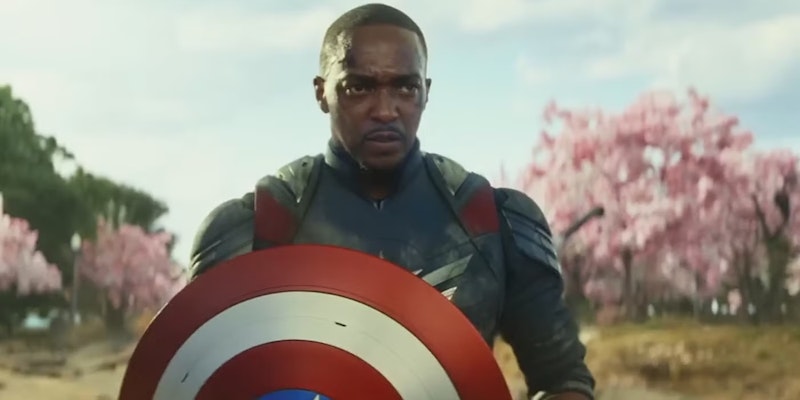Give Marvel credit. Though Captain America: Brave New World isn’t a great movie—too busy, too reliant on old Hulk backstory elements we don’t really care about—it shows they can still do a movie about politics without making the movie itself feel like it’s a political artifact.
Like a bigger-budget episode of Homeland, it’s got Washington streets, military planes, and SUVs being hit with explosives. All that stuff works. The political speeches are given by a president and not meant to be trusted, as opposed to being given by whichever character is noblest and most needs to get a real message to us in the captive audience.
In keeping with Marvel’s recent attempt to course-correct after some overly p.c. on-screen moments, this at least feels like what passes in action movies for “grown-up politics” (corruption, grenades, etc.) instead of “college kids politics” (girl power, pronouns, socialism).
Still, the awareness that Anthony Mackie, fine acting job though he does, feels more like Falcon than like Capt. America may nag at the viewer, and no matter how good the Red Hulk motion-capture digital animation looks, you’ll likely spend most of their battle thinking something along the lines of, “If this Hulk stuff didn’t look like a videogame, I’d be worried the aged Harrison Ford was going to hurt himself.” Wonderful he’s still at it, in any case.
What really vexed me, though—and will likely keep a few other obsessive nerds out there awake at night longing for answers—is the fact that Marvel can’t stick to a coherent fictional chronology. Can’t they just have a meeting? Isn’t there an office email chain? Can Marvel CEO Kevin Feige just make a list with dates on it when he has a spare moment?
Luckily, unpaid fans have labored not just to keep track of when each of the Marvel Cinematic Universe movies takes place but to come up with explanations for the endless, usually unnecessary continuity problems the films (and TV shows and spinoff comics) have created. Most of the problems have been solved. But trying to cram presidents both real and fictional into the stories—now including one played by Ford—has pushed the fictional space-time continuum to its breaking point.
The MCU references to various presidents—including alien-hating President Ritson last seen in fictional late-2026, and Ford’s Thaddeus “Thunderbolt” Ross in Captain America: Brave New World—have been so numerous, have gone into and out of the Oval Office in such a hectic flurry, that (without foisting all the math on you) the only way scorekeeping online fans have been able to make sense of it all is to assume that starting in fictional 2018 (right after the villain Thanos made half the population disappear in Avengers: Infinity War), the U.S. began an unprecedented legal do-over and held presidential elections in that year and every four years afterwards—including November 2026, when Brave New World opens and Ross is elected, followed by glimpses of his first hundred days in office in early-2027.
It jibes with the most Rube-Goldbergian fan theory about MCU presidencies but not one ever overtly confirmed on-screen (until now). If you look close, you’ll see props of party invitations during that first 100 days of Ross that clearly say April 2027.
If the May movie Thunderbolts* takes place shortly thereafter, that’ll place it about two fictional years since we last saw the character Val a.k.a. the Contessa, played by Julia Louis-Dreyfus, who was last seen assembling antiheroes to join the Thunderbolts but also ascending to the position of CIA director. I hope that Thunderbolts* will seize the opportunity to say Val has been further promoted to the role of Director of National Intelligence, since she happens to look more than a little like the woman who just got confirmed to that position in the real world (in 2025), namely gun-toting Tulsi Gabbard, right down to the cool skunk-stripe in her hair.
Making Julia an overt Tulsi analogue in Thunderbolts* shouldn’t cause any more controversy than we’ve already witnessed over Brave New World containing the heroic but jarringly petite Mossad-agent character codenamed Sabra (after a tough, prickly pear), who has inspired some pro-Palestinian protests. But, heck, at this point, I think a lot of Marvel fans would be content to see pretty much any theory of, say, culpability for the Seven-Day War or the Oct. 7 attacks floated in the films, so long as the writers got the number of days and the month of the year right—and didn’t try to convince us that Muslim heroine Ms. Marvel and Tom Holland’s Peter Parker are the same age or some algebra-defiling nonsense like that.
But then, I suspect we’ll eventually be told that the entire multiverse was first created when Iron Man invented time travel in Avengers: Endgame (spawning branching timelines never really seen before that in the MCU) and thus that it’ll all get rebooted in two years when his doppelganger Dr. Doom, also played by Robert Downey Jr. (and not to be confused with Kang the Conqueror), gets defeated. There’ll be time then to tidy up the dates and contradictions. Or create 1000 new ones but with younger actors.
—Todd Seavey is the author of Libertarianism for Beginners and is on X at @ToddSeavey

